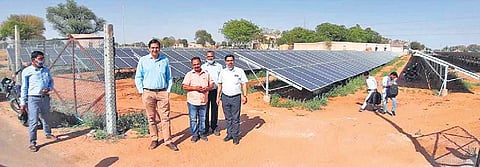

RAJASTHAN: According to the World Bank, power outages are common across India as over 300 million people in the country still don’t have access to electricity. Rajasthan went through a serious power crisis recently as nine thermal units were shut due to coal shortage. Despite buying electricity at expensive rates, lakhs of people in the state spent a harrowing time in the second fortnight of August.
A modest farmer family from Rajasthan’s Jaipur district offers a ray of hope. Devkaran Yadav and his son Dr Amit Yadav set up a solar plant on their semi-arid 3.5-acre farmland in Bhaloji village near Kotputli town. It is the first farm-based solar power plant in Kotputli under the Prime Minister’s Kisan Urja Suraksha Evam Utthan Mahabhiyan (KUSUM) scheme. For people in the region who have vast, uncultivated lands at their disposal, the solar plant has become a lucrative model.
The Yadavs have entered into a contract with the Rajasthan Renewable Energy Corporation Ltd for 25 years. It was Dr Amit Yadav (35) who took the initiative for setting up the solar project that has now become a money spinner for the family, earning them over 4 lakh per month.
He says a few years ago, they had received a huge but incorrect electricity bill. The frustration over getting the bill rectified motivated him to look for alternatives. The search for a more reliable source of electricity for his private hospital took him to solar energy. Soon, he installed solar panels for a 11-KW plant at a cost of Rs 2.5 lakh. Its success not just inspired Dr Yadav and his family but also made them do extensive research on the benefits of solar energy.
Then he came to know about the KUSUM scheme. “We had farmlands but due to lack of groundwater, they had turned into barren fields. So, in 2019, we moved an application to set up a 1 MW project under the scheme,” recalls Dr Yadav.
In September 2020, they signed a contract with the Central government to produce solar energy under the scheme. Since many of his relatives had shares in the parcel of land that the family owns, they had to be convinced. Ultimately, it was Dr Yadav’s assurance that he would bear all the risks that pulled down all barriers.
For setting up the project, however, a hefty sum of Rs 3.5 crore was needed. Devkaran Yadav invested Rs 70 lakh from his retirement benefits, besides mortgaging some of his properties to a bank which helped raise Rs 1.7 crore. Dr Yadav said, “The scheme was new and involved risks. I also carried the huge psychological pressure that all my father’s retirement money would be put to risk if we flopped.”
The family also faced a host of other difficulties. For instance, they had no idea about the layout diagram about which even local officials seemed clueless. Also, permissions had to be taken to supply the electricity to the power grid. A lot of officials were indifferent to their project.
Even after the installation was complete, the commissioning of the plant went into rough weather as the government had not appointed a nodal monitoring officer under the scheme. Even a notice by Dr Yadav bore no fruit and the commissioning was delayed by almost three months. He lodged a complaint with the PMO. “This complaint was duly attended and the work, thereafter, went off at a breakneck speed,” Dr Yadav says.
Farmland turns money-spinner for Yadav family
This 1 MW project has the capacity to produce 17 lakh units of electricity per year. The project has been developed at a cost of Rs 3.70 crore and is expected to generate an annual income of about Rs 50 lakh for the Yadavs from the purchase of electricity by discoms at Rs 3.40 per unit.
ALSO WATCH | American Beauty in Kerala - A dragon story like no other